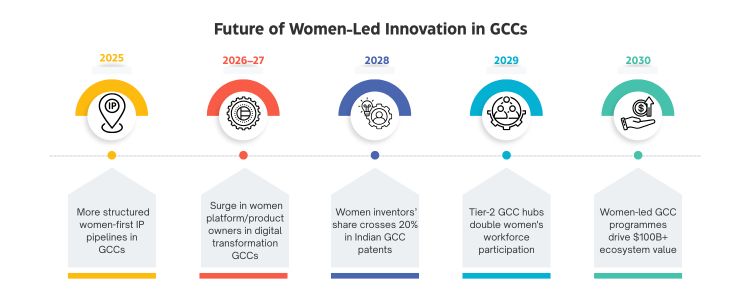
A woman data scientist at a Bengaluru Global Capability Centre (GCC) led her staff to turn a fraud detection algorithm into a service based on a platform in four regions. This project not only notably decreased the false positives but also led to a novel intellectual property (IP). Such a success story is now becoming a trend among women in the GCC innovation ecosystem in India. India is a world center of GCCs and has more than 1,900 centers where almost 1.9 million people work. The market is expected to expand to more than $100 billion in the year 2030. A major boost behind this growth is the active role of women in the GCC, who now constitute 35% of the GCC workforce, as compared to 26 percent in 2016. The number of women in senior leadership positions in the tech industry is 23% and is on the increase. This is because GCCs are evolving into an important source of economic growth through the concentration of high-skill labour in artificial intelligence, cybersecurity, and cloud computing. This emphasis leads to acceleration of time-to-market and IP development. The shift of GCCs to Tier-2 cities will stimulate this further through access to new pools of talent and creating economies of scale.
A) Patents: Female Leaders’ Core IP Women-led teams of inventors in the GCCs of India are taking on more and more patents in emerging and growing fields such as computer technology and security. There is an increasing number of women joining algorithmic diagnostics and model governance teams, which feed the IP committees of multinational corporations. B) Platforms: Women in Digital Transformation. A major movement is in progress, with around a third of transformation-orientated GCCs currently operating platform-based delivery models. These are API-first, product-centric and reusable models. The operations, growth, and uptake of these platforms are centrally guided by women programme leads and product owners. The path of a small pilot to a global platform is usually well defined: problem framing, building a minimum viable product (MVP), platformisation, compliance by design, rollout globally and then harvesting IP & generating revenue. Women are taking the initiative at every stage of this process and demonstrating their role in the GCC innovation ecosystem. C) Products: Pilot to Global Adoption Women-led teams are developing prototypes into global enterprise products. These are risk-tech, customer experience, and sustainability dashboards. This is a trend that is casting grey boundaries between headquarters and GCCs in terms of ownership and accountability.
Several factors are contributing to the emergence of women leaders in GCCs: Expansion of Tier-2: The expansion of new GCC hubs in Tier-2 cities increases access to opportunities among women, besides enhancing cost structures among businesses.
The further active development of the GCC sector, we can expect:
Women entrepreneurs in GCCs are transforming female innovators into patent, platform and product owners. This does not only increase competitiveness but also boosts inclusivity in the GCC innovation ecosystem as a whole. The women in GCCs have the potential to shape the next generation of digital value creation with structured IP pathways, platform-led delivery, and leadership opportunities.
Collaborate with Inductus GCC on the design and deployment of women-first IP pipelines, scale platform-led delivery, and benchmark leadership metrics in your GCC. We should also co-invent patents, platforms, and products that are moving markets – responsibly and at scale.
A GDC refers to a single-minded offshore deployment, which provides proficient business, technology and operational services to corporate bodies on a global basis. BFSI, IT services, healthcare, telecom, retail, manufacturing, and other upcoming technologies, including AI and blockchain. They do not only target cost savings but now aim at innovation, automation, R&D, digital transformation, and high-value consulting. They design and create cloud, artificial intelligence, analytics, cloud security, and process automation. A large supply of STEM graduates, multilingual workers and niche skills in AI, ML, cloud, and analytics. Aditi, with a strong background in forensic science and biotechnology, brings an innovative scientific perspective to her work. Her expertise spans research, analytics, and strategic advisory in consulting and GCC environments. She has published numerous research papers and articles. A versatile writer in both technical and creative domains, Aditi excels at translating complex subjects into compelling insights. Which she aligns seamlessly with consulting, advisory domain, and GCC operations. Her ability to bridge science, business, and storytelling positions her as a strategic thinker who can drive data-informed decision-making.
Case Studies
IP Focus Area
Typical GCC Role Mix
What Women Led
Business Outcome
Fraud ML models
Data science + model risk
Feature strategy & validation
Lower loss rates, PCT filing
Med-image AI
ML Ops + clinical QA
Bias testing framework
Faster approvals, reuse across SKUs
IoT sustainability
Edge + analytics
Sensing calibration
Energy savings, green reporting

Facilitators of Women-Led Innovation
What's Next (2025-2030)
Conclusion
frequently asked questions (FAQs)

Aditi
Hey, like this? Why not share it with a buddy?
Related Posts
Recent Blog / Post
- Why Mid-Sized Companies are Embracing the GCC Model October 16, 2025
- What Is A Global Capability Center (GCC), and Why Is It Essential For Modern Business? October 16, 2025
- Gurugram’s Tech Ascent: Decoding the New Haryana GCC Policy October 15, 2025
- Scaling Your Tech Team: A Beginner’s Look at the Offshore Development Center October 15, 2025
- Agile Methodologies for GCCs: A Blueprint for Success October 6, 2025
- The Legal and Compliance Checklist for a New GCC Setup October 4, 2025
- The Rise of Niche GCCs: A Focus on Specialised Capabilities October 4, 2025
- The Impact of Regulatory Changes on GCC Operations October 4, 2025
- Cybersecurity for GCCs: A Proactive Approach to Data Protection September 30, 2025
- Beyond Cost: Measuring the True ROI of Your GCC Investment September 29, 2025
- The Future of GCCs in the Retail Sector: A Strategic Playbook September 29, 2025
- David vs Goliath: Mid-Sized GCCs Quietly Outperform the Big Brands September 29, 2025
- Infineon’s Big Bet on India: Inside Its First GCC in GIFT City September 29, 2025
- From Campuses to Capability Centres: How Indian Universities Power the Global GCC Ecosystem September 29, 2025
- Retail Meets Digital: Costco’s GCC in Hyderabad Marks a Global Shift September 29, 2025
















